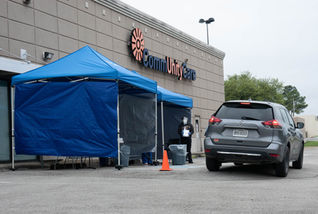Design in
Health
In-house design consultancy
for an academic medical center
Three projects from my employment with The Design Institute for Health at Dell Medical School (University of Texas, Austin)
Project 1
Inter-Generational
Food Program
Client
St. David's Foundation,
Lone Star Circle of Care
My Contributions
3 months
My Role
Secondary Research,
Community Research,
Ecosystem Mapping,
Concept Synthesis & Development,
Program Roadmapping
Teammates
Jacob Rader,
Rose Lewis,
Jessica Murray
Funded by St. David’s Foundation and working with Lone Star Circle of Care,
Meals on Wheels, Head Start, and Opportunities of Burnet and Williamson Country,
we spent three months scoping the need for and viability of creating programs for intergenerational connection and food access for the community of Taylor, TX.

Community Research
During the initial phase of our work, our team participated in Taylor community events and conducted interviews with
key community figures and subject matter experts in farming, food, intergenerational care, and education. Additionally, we conducted secondary and analogous research to understand best practices and exemplary intergenerational and food programs locally and nationally.



Making the Case for an Inter-generational Food Program
As part of our research, we looked at how the history and physicality of Taylor impact the community and shape how resources are distributed.

In addition to mapping the resources on a geospatial map of the town, we also mapped the connections between organizations working in and around Taylor, highlighting potential partnerships.
Final Deliverables
Leveraging various resources within Taylor we worked with our partners to translate those ideas into a “Ingredients” and “Recipe” framework that we created. Ingredients were program building blocks achievable in a shorter time frame and recipes were a roadmap of a more cohesive intergenerational food program containing multiple ingredients.
Working with our partners we used the Ingredients & Recipe Framework as fodder to help identify key opportunity areas that we could turn into pilot programs.

Project 2
Corage
Client
the Texas Center for Pediatric and Congenital Heart Disease
My Involvement
3 months
My Contributions
Mapping Support,
Workshop Facilitation,
Concept Illustrations
Teammates
Adam Zeiner,
Taylor Cook,
Diana Gonzales,
José Colluci
With the goal of improving this lifelong journey of patients with Congenital Heart Disease (CHD), the Texas Center for Pediatric and Congenital Heart Disease partnered with Dell Medical School's Value Institute for Health and Care and the Design Institute for Health to redesign the way we provide care for patients with congenital heart disease in a more comprehensive/holistic way that considers all different determinants of health, from diagnosis and birth throughout the entire lifetime.
Patient and Family Interviews
A total of 33 experience group sessions and six one-on-one interviews were conducted with 79 families. There were 140 total individual participants.
(I was not part of this phase of the project)
See a more in-depth explanation of the effort here: https://coragemap.com/
Patient & Family Journey Maps
The details and insights from the interviews with single-ventricle congenital heart disease patients and their families informed the development of journey maps that accounted for all the different stages a patient experiences throughout their entire life.

Opportunities for Improving the Lives of Those Affected by Congenital Heart Disease
39 concepts were developed to address challenges faced by patients and their families throughout their lifespan, as a result of journey maps and co-design workshops involving stakeholders, real-life patients, and families.
I created these lo-fi illustrations to help give a bit more life to the concepts.
Published Research
This project was an IRB-approved research study.
The findings were published in
The Journal of the American Heart Association.
See the published article here: https://www.ahajournals.org/doi/full/10.1161/JAHA.122.027556

Project 3
COVID-19 Drive-Thru Testing
Redesign
Client
UT Health Austin,
CommUnityCare Health Centers
My Involvement
1 month
My Contributions
Secondary Research,
Process Analysis,
Instruction Guide Design
Teammates
Stacey Chang,
Rose Lewis,
Gwen Gage,
Diana Gonzales,
Natalie Campbell,
José Colluci,
Lauren Gardner
In April 2020, COVID-19 drive-thru testing facilities were established at Dell Medical School and at a local federally qualified health center, CommUnityCare Health Centers, both in coordination with the local public health department.
Early in the establishment of these testing sites, Dell Medical School asked our team
to identify challenges and opportunities to improve the workflow design and enable scaling of these types of testing sites in the context of limited supplies.

Strategy & Deliverable
Use service design methods to map and identify system weaknesses, and then redesign an improved and ready-to-scale workflow. Provide the suggestions and instructions as a free to the public resource for others looking to quickly set up drive-thru testing sites.

Evaluating Current Operations
Our design teams conducted observational field research and interviews with the professionals operating the UT Health Austin/Dell Medical School and CommUnity Care Austin drive-thru testing sites.
From these observations, we discovered the testing workflow could be simplified into six sequential steps:
Screening, Intake, Collection, Processing, Consultation, Education.
Impact for Our Local Testing Sites
Several of the design recommendations were adopted by the UT Health Austin drive thru testing sites. Feedback from local partner CommUnityCare Health Centers’ testing site shows that implementing suggested protocols for screening people into separate service lanes for testing and educating has minimized what was initially a long waiting line into parallel tracks that address needs and increase throughput.
For the Public Good
Our design team synthesized our system and process suggestions and created an open source guide to help other organizations and municipal entities more quickly set-up their own COVID-19 drive-thru testing operations.












